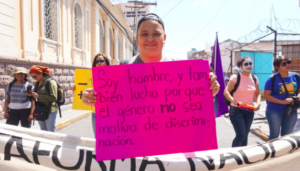This blog was originally posted on SVRI.org. To see the original post, click here: www.svri.org/blog/designing-zonasegura-mobile-solution-combat-teen-dating-violence-honduras
#16DaysofActivism 2018 Blog Series
Written by Jaclyn Shea, MPH
Young people in Honduras experience some of the highest rates of teen dating violence in the world. Almost one-third of the 15-19 year-olds who are or have been married report experiencing psychological, physical or sexual abuse at the hands of their partner in the past year[1].
ZonaSegura
ZonaSegura is a trauma-informed, youth-centered innovative mobile solution to address teen dating violence in Honduras. Led by YTH (Youth+Tech+Health) in partnership with GOJoven Honduras and the Public Health Institute’s (PHI) GOJoven International Program, the project aims to prevent teen dating violence through provision of prevention information, healthy relationship education, and geo-location linkage to services and resources.
With nearly 90 percent of the population having access to at least one mobile phone, we are leveraging the high rates of mobile phone to overcome individual and structural barriers to accessing rights-based and gender-sensitive teen dating violence prevention information and services.
“Many young people don’t feel comfortable asking friends or family about relationships and dating violence, and prefer to use the internet to learn more,” said Katta Diaz in an expert interview.
ZonaSegura is also a research study so we can evaluate the efficacy of the mobile application and SMS campaign. We recently got IRB approval from the Public Health Institute. The mobile application will be designed for young women and girls in addition, along with an SMS campaign for both young women and girls, and young men and boys.
ZonaSegura is possible thanks to support from Sexual Violence Research Initiative (SVRI) and the World Bank’s 2018 Development Marketplace for Innovation in Gender-Based Violence.
Using youth-centered health design
To develop ZonaSegura, YTH is using youth-centered health design. This approach focuses on building deep empathy with the community being designed for, generating many ideas, building prototypes, sharing with the community, and eventually putting the new, innovative solution out into the world. “Co-designing with youth ensures that we benefit from the resilience, wisdom and creativity of young people and design solutions that are truly youth-centered and more likely to succeed,” said YTH Executive Director Bhupendra Sheoran.
To design the ZonaSegura mobile application and SMS campaign, members of the YTH and PHI team are conducting three design workshops in Honduras: two with girls and one with boys.
In these workshops, we are asking questions about mobile and smartphone use, cultural norms surrounding relationships, gender roles, and teen dating violence, and presenting early prototypes or mock-ups to get feedback on the design and messaging.
The insights we gain will inform the content we develop for the application and SMS campaign as well as the functionality and appearance of the application.
Follow YTH on Twitter at @YTHorg, on Facebook at facebook.com/YTHorg, and on Instgram @YTH.org
_____________________________________________________________
Jaclyn Shea is a Program Officer at YTH (Youth+Tech+Health) where she manages research and design projects developing innovative health solutions for youth. She received her MPH from The Gillings Schools of Global Public Health at UNC Chapel Hill in the Department of Health Behavior and is passionate about putting youth voices at the center of design.
[1] Sexual and Reproductive Health of Young Women in Honduras. (2016, July 26). Retrieved October 05, 2017, from https://www.guttmacher.org/fact-sheet/sexual-and-reproductive-health-young-women-honduras

